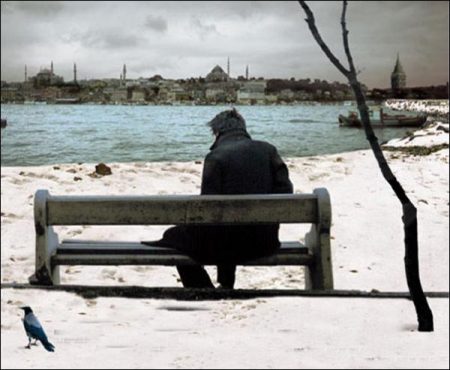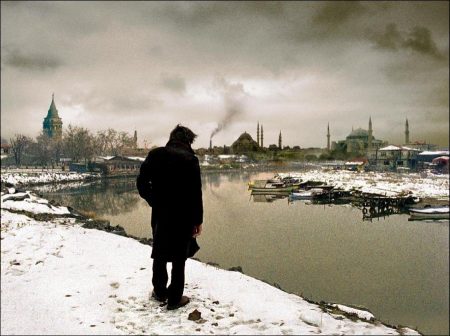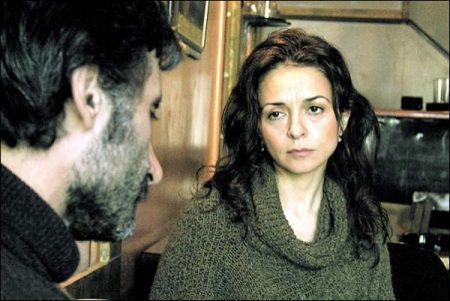Turkish film Distant – Uzak tells the story of Yusuf (Mehmet Emin Toprak), a young factory worker who loses his job and travels to Istanbul to stay with his relative Mahmut (Muzaffer Özdemir) while looking for a job. Mahmut is a relatively wealthy and intellectual photographer, whereas Yusuf is almost illiterate, uneducated, and unsophisticated. The two do not get along well.
Yusuf assumes that he will easily find work as a sailor, but there are no jobs, and he has no sense of direction or energy. Meanwhile, Mahmut, despite his wealth, is aimless too: his job, which consists of photographing tiles, is dull and inartistic, he can barely express emotions towards his ex-wife or his lover, and while he pretends to enjoy intellectual filmmakers like Andrei Tarkovsky, he switches channels to watch porn as soon as Yusuf leaves the room.
Mahmut attempts to bond with Yusuf and recapture his love of art by taking him on a drive to photograph the beautiful Turkish countryside, but the attempt is a failure on both counts. At the end of the film, Yusuf leaves without telling Mahmut, who is left to sit by the docks, watching the ships on his own.
Uzak is a 2002 Turkish film directed by Nuri Bilge Ceylan. It was released as Distant in North America, a literal translation of its title. The movie is the winner of 31 awards including Best Actor at Cannes, Special Jury Prize at Chiago, and Best Balkan Movie at Sophia International Film Festival.
Film Review for Distant – Uzak
Down and out in Istanbul. Distant, the third film by Turkish director Nuri Bilge Ceylan, who in addition wrote the script and was in charge of editing, draws a bitter portrait of a country struck by crisis. Through two existences without a possible future, the director tells a universal history where loneliness, disillusion and despair mix.
The reel amplifies the sound of shoes on snow. A man advances towards the foreground. From fields to the road, a village to the city, unemployment to the hope of getting a job. Slowly, the man advances on the white expanse. From the first sequence, what is striking about Ceylan’s filming is time and discretion. This director takes care to disappear in order for his camera to view the faces and the movements of his characters.
He takes the time to wait for the emotion that will emerge from the corner of a wrinkle on the face, from an absent glance inhabited by interior demons. He patiently lurks in a corridor, until the moment when the accident occurs: the simple appearance of a protagonist in the camera’s shot. An effective tactic, since the comedy of one situation, like the tragedy of another, rewards the audience’s patience each time that he goes to the trouble to wait.
Contrary to the characters, who spy on their fellow man only to find nothingness and sadness. And when the distress is read on the faces, when it is delivered very naked to the eyes, then the director caresses it with his camera. Without separating himself from a certain decency, from a humble and sincere tenderness for these lost beings. Alone in a cosmopolitan city where happiness will be always reserved for the others, alone among thousands, such are the two main characters of Distant.
Mahmut works as photographer, primarily for a tile factory. His days are spread out with the tedious rhythm of paper filing, amorphous channel surfing and meetings with prostitutes, in the middle of clichés that testify to a more artistic past. Without passion or joy, just with a hardly assumed fate. His mother suffers from a disease, his ex-wife emigrates to Canada in a few days with her new man. One day Yusuf, a member of his family who’s left the village to try his luck in Istanbul in the merchant navy, arrives at his home. Thus begins a cohabitation where communication is reduced to the bare minimum.
Yusuf’s mother, penniless, cannot pay the dentist to cure her of a toothache, the office of port recruiting closes its doors to him, and Mahmut does not encourage him to stay at his place too long. Then he feigns waiting for answers from potential employers, hangs out in the streets, in the bars, not by vice, just by boredom and spite, and all his attempts to make some acquaintances (the opposite sex, if possible) fall through. The two broken beings of Distant are not very talkative. Because fatigue and lassitude took over their pugnacity. Without existence in a society in crisis, Yusuf disappears from the last place where he could have existed at least in the eyes of his silent relative, as he came: without announcing himself, without warning.
About the Story
A photographer who is haunted by the feeling that the gap between his ideals and his real life is growing finds himself obliged to put up in his apartment a young relative who has left behind his village looking for a job aboard a ship in Istanbul to go abroad.
Mahmut is a relatively successful commercial photographer who has been struggling to come to terms with the growing gap between his artisitc ideals and his professional obligations. His tedious workload, coupled with the lingering loss he still feels for his ex-wife (newly married and on the verge of leaving Istanbul for Canada), leaves Mahmut clinging to the melancholic and obsessive routines of solitary life. Without warning, Mahmut’s distant relative Yusuf arrives in Istanbul determined to find a job aboard a ship so that he may fulfill his dream of traveling around the world.
In need of a place to stay as he searches for work, Yusuf imposes himself on Mahmut, who resents the sudden intrusion, but nonetheless feels obliged to help his family. It doesn’t take long for Yusuf to discover that the the work he is looking for isn’t available, but he manages to prolong his stay by formulating stories that would suggest otherwise.
Distant (2004)
Uzak
Directed by: Nuri Bilge Ceylan
Starring: Muzaffer Özdemir, Emin Toprak, Zuhal Gencer Erkaya, Nazan Kırılmış, Feridun Koç, Fatma Ceylan, Ebru Ceylan, Ebru Yapıcı, Aslı Orhun, Ahmet Bugay
Screenplay by: Nuri Bilge Ceylan
Cinematography by: Nuri Bilge Ceylan
Film Editing by: Nuri Bilge Ceylan, Ayhan Ergürsel
Art Department: Adnan Sahin
Distributed by: New Yorker Films
Release Date: March 12, 2004
Views: 95







